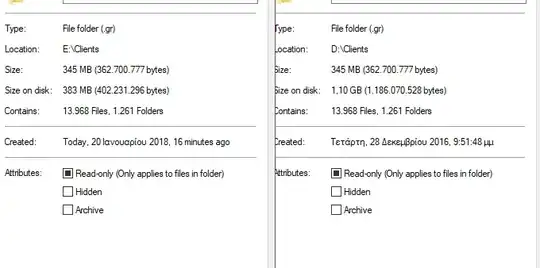It should also be noted (although it's probably not relevant to this particular case) that Robocopy does not preserve NTFS compression, so if there are compressed files in the source folder (they usually appear in blue color), the destination folder will be significantly larger. It may or may not be the same for “sparse” files.
SynchronizeIt is a file copy tool which I use a lot : like Robocopy, it preserves all timestamps (including directory timestamps, which is very rare among Windows tools), and it preserves the C attribute, meaning, the NTFS compression. But there's one caveat : it first copies the file uncompressed, then applies the NTFS compression, which increases the copy time. The current official version also has a bug : if an input file has the “sparse” attribute, the copy gets corrupted (only the first clusters are actually copied, the rest ends up empty). It can be a problem even for someone not knowingly using the “sparse” NTFS feature, as many download managers or file sharing applications set it by default to minimize the allocated size of partial files. In 2015 the author provided me with a corrected version, but for some reason never made it public (the available version hasn't been updated since 2009).
WinHex has a function called “Replicate directory” which can directly copy compressed files as compressed, but it does not preserve timestamps. Applying Robocopy /CREATE /DCOPY:T afterwards on the same directory corrects all timestamps very quickly without re-copying the files.
